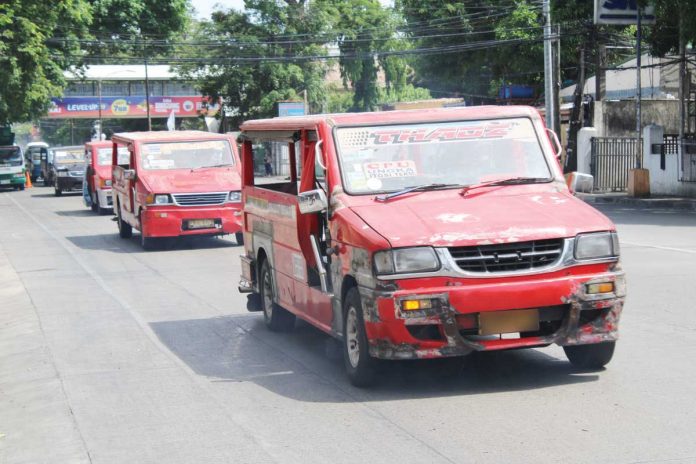
ILOILO City – A brewing storm is gripping Iloilo’s transport sector after Department of Transportation (DOTr) Secretary Vince Dizon reportedly assured protesting drivers that unconsolidated public utility jeepneys (PUJs) will soon be allowed back on the road — a move that has alarmed cooperatives and transport corporations who already invested millions in the government’s modernization program.
The assurance was reportedly made during a protest organized by the Pagkakaisa ng mga Samahan ng Tsuper at Operator Nationwide (PISTON) on April 7. “Before the Holy Week is over, we will already have a mechanism — that decision that you will return, it’s already there,” Dizon was quoted as saying in a media interview during the protest.
“I have already issued a directive. What’s being discussed now is the mechanism to allow your return,” Dizon added, giving hope to hundreds of unconsolidated jeepney drivers who were barred from operating after failing to join cooperatives as required under the Public Utility Vehicle Modernization Program (PUVMP).
But the statement triggered anxiety among consolidated groups in Iloilo City, where 93 percent of jeepneys have already joined cooperatives and routes have been officially awarded under the approved Local Public Transport Route Plan (LPTRP).
For Western Visayas Alliance of Transport Cooperatives and Corporations, Inc. (WVATCCI) President Rizal Alido, the possible return of unconsolidated jeepneys could spell disaster.
“If this happens, we might be forced to surrender our modernized units and shut down,” said Alido. “Honestly, almost all of us already have overdue loans with banks because 30 to 50 percent of our projected income is being lost to unregistered and colorum vehicles.”
Alido said they are still waiting for an official memorandum from the DOTr to determine the scope of Dizon’s pronouncement. He remains hopeful that Iloilo City — with its high consolidation rate and fully awarded routes — will be exempted from the policy shift.
So far, WVATCCI has already acquired 555 out of the 1,782 modernized units awarded to them, each costing around P2 million. “We hope Iloilo City will be spared,” Alido said.
Perfecto Yap, adviser to both Joroshely Transport Services and WVATCCI, echoed Alido’s concern, saying that Dizon’s statement might only apply to new or developmental routes in LGUs that have no approved LPTRP — not to cities like Iloilo.
“In Iloilo City’s case, we’re asking for exemption because all areas have already been awarded and 93 percent of PUJs are consolidated. These routes were studied thoroughly before they were awarded,” Yap emphasized.
Yap warned that if unconsolidated units are allowed back across all routes, modernized operators would suffer severe financial blows. “The viability of our units will collapse. We’re already struggling with loan payments due to inconsistent pronouncements from the government.”
He added that their sector embraced modernization because they believed it would deliver safety and convenience to passengers — unlike many traditional jeepneys which are no longer roadworthy.
Raymundo Parcon, president of the Western Visayas Transport Cooperative (WVTC), was more scathing in his remarks. “We followed the government’s program. We invested millions. Now, Secretary Dizon suddenly interferes — how are we supposed to recover our investments?” he said in an interview with Aksyon Radyo Iloilo.
Parcon questioned the legality of allowing unconsolidated jeepneys to operate again. “They don’t have franchises. They are technically illegal,” he pointed out.
For Parcon, the government’s wavering stance on the PUVMP erodes trust. “Does our government have no conviction? That’s why even we, who followed the program, are starting to doubt them. They can’t implement programs properly.”
On the other side of the debate, Elmer Forro of the No to PUV Phaseout Coalition welcomed Dizon’s assurance. Forro said the secretary made a similar commitment during a dialogue on March 21 and that a formal statement was expected.
“Secretary Dizon said in front of the media that the franchises will be returned — that means the unconsolidated units can now register,” Forro told Panay News.
He claimed the development is not only a win for unconsolidated drivers, but also for cooperative members who have grown disillusioned with alleged corruption and mismanagement inside their organizations.
“Many are now eager to leave the cooperatives. They’ve had enough of the abuses and fake leaders,” Forro said.
Still, he called for an official memorandum from DOTr to make Dizon’s assurance legally binding.
According to Forro’s data, Iloilo City has around 2,500 traditional jeepneys, of which only 1,700 have consolidated — leaving about 800 unconsolidated units that stand to benefit from the policy reversal.
As tension mounts between compliant operators and disenchanted unconsolidated drivers, the future of Iloilo’s public transport hangs in the balance — caught between promises of progress and the harsh realities of policy backpedaling./PN




